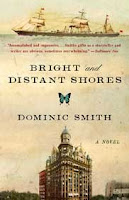Publisher: Washington Square Press
Date: September 13, 2011
Format: paperback
Acquired: from Atria Galley Alley
Read: for review (disclaimer: I received my copy of this book in return for an honest review.)
Pages: 470
Reading time: one week
From GoodReads: In the waning years of the nineteenth century there was a hunger for tribal artifacts, spawning collecting voyages from museums and collectors around the globe. In 1897, one such collector, a Chicago insurance magnate, sponsors an expedition into the South Seas to commemorate the completion of his company’s new skyscraper—the world’s tallest building. The ship is to bring back an array of Melanesian weaponry and handicrafts, but also several natives related by blood.
Caught up in this scheme are two orphans—Owen Graves, an itinerant trader from Chicago’s South Side who has recently proposed to the girl he must leave behind, and Argus Niu, a mission houseboy in the New Hebrides who longs to be reunited with his sister. At the cusp of the twentieth century, the expedition forces a collision course between the tribal and the civilized, between two young men plagued by their respective and haunting pasts.
My review: I found Bright and Distant Shores to be a slow but ultimately worthwhile read. I generally enjoyed the author's writing, which seamlessly interweaves a huge amount of historical and anthropological details into the story. At times, though, it came off as just dense - by about the middle of the novel I was getting bored and considered not finishing. I am glad that I did finish the book, however, because it turned out to be a very well-written, interesting read in one of my favorite genres.
I loved the characters created by Dominic Smith. He picks his subjects from among the awkwardly-situated social ranks often neglected in historical fiction: the middle class and the colonized peoples. Owen Graves is not quite the poor orphan in rags-to-riches stories, but he is not at all wealthy, either, instead being just a hard-working man courting an upper-class charity and museum worker. Argus Niu is neither a colonizer nor a "savage" - he is a fairly educated, well-spoken Poumetan caught in between the allures of white civilization and the traditional lifestyle of his people. All in all, the social positions and trials of Smith's cast of characters are quite fascinating.
The author's development of plot and characterizations is excellent. I never felt like the characters were left at all underdeveloped, and their motives and desires were clear and understandable. The plot, though relatively slow, felt complete. No loose ends were left at the end of the book, and I was very pleased that Smith continues the characters' stories well past the end of their Pacific journey. The reader is not left wondering, "But what happened after?"Almost everything is tied up, leaving a satisfying conclusion to an interesting and historically informative read.

This one does sound good. I appreciate the honesty review and knowing that it can be slow. But, somehow slow with well developed characters isn't a bad thing. It's slow with undeveloped characters that is hard to read!
ReplyDelete